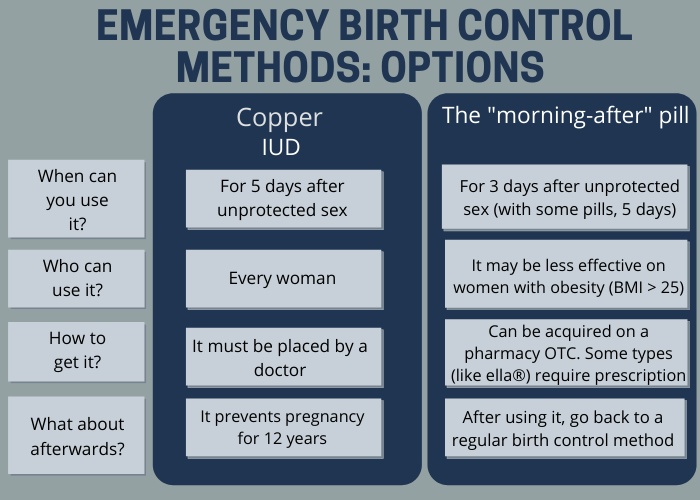Emergency contraceptive is a birth control method to prevent pregnancy after unprotected sex. It can be used:
- After a sexual assault or rape.
- When a condom breaks.
- When you forget to take your birth control pills.
- When you have sex without any contraceptive method.
Types of emergency contraception
Emergency contraception prevents pregnancy by blocking fertilization.
There are 2 types of emergency contraception:
- Morning-after pill. This is the most common method.
- Copper IUD
Morning-after pill
Two emergency pills can be bought without a prescription:
· Plan B One-Step is a single tablet.
· Next Choice is taken in 2 doses. You can take both pills at the same time or as 2 separate doses with a 12-hour interval.
You can take them up to 3-5 days after unprotected sex. However, the sooner you take them, the better.
There is a new pill called ulipristal acetate (Ella). This one requires a prescription from your doctor.
IUD
Getting an IUD is another form of emergency birth control, although it’s not so common.
It must be inserted within 5 days, and it must be a copper IUD type.
The doctor can remove it afterwards or you can choose to leave it for regular birth control.

Effectiveness
Pills work best when taken within 24 hours after sex. Even though you can take them for 3 days after sex, it’s better if you take them during the first 24 hours.
After that, their effectiveness decreases with each day.
Also, pills are less effective in obese women. For them, Ella may be a more reliable option.
There are some drugs that make morning-after pills less effective. These include:
- drugs for epilepsy
- medicines for tuberculosis
- HIV treatment
- some fungicides (for fungal infections)
Side effects
Emergency contraception can cause side effects. They are usually mild, including:
- Changes in menstrual bleeding
- Fatigue
- Headache, dizziness
- Nausea and vomiting
After using the pill, your next period may start earlier or later than expected. Also, menstrual flow may be lighter or heavier than normal.
If your period is more than 3 weeks late, you could be pregnant, and you should visit your doctor.
Finally, if you get an IUD, there is a risk of getting a pelvic infection or uterus perforation (rare, but you never know).
Some important things about emergency contraception
Emergency birth control will not work if you are already pregnant.
Very importantly, they won’t protect you against sexually transmitted diseases
You should never use emergency pills for regular contraception. Copper-IUD, on the contrary, can be used for regular contraception. After a few days, you can choose whether to have it removed or leave it for regular contraception.
If you are using regular contraception (pills), you should use a condom for 10 days. The morning-after pill can reduce their effectiveness.
Sources
https://www.ouh.nhs.uk/patient-guide/leaflets/files/43583Pcopper.pdf
https://www.hra-pharma.com/PIL/UK/
https://www.accessdata.fda.gov/drugsatfda_docs/label/2009/021998lbl.pdf
Leave a Reply